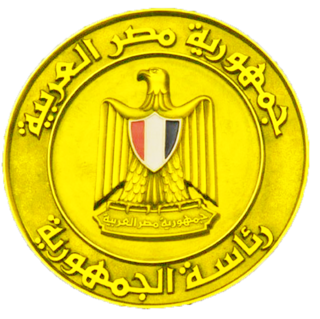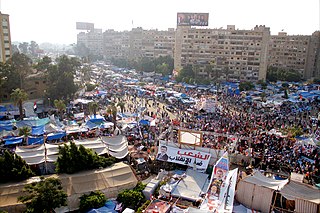Related Research Articles

The politics of Egypt takes place within the framework of a republican semi-presidential system of government. The current political system was established following the 2013 Egyptian military coup d'état, and the takeover of President Abdel Fattah el-Sisi. In the current system, the President is elected for a six-year term. Furthermore, the President has the power to dissolve Parliament through Article 137. The Parliament of Egypt is the oldest legislative chamber in Africa and the Middle East. The unicameral Parliament has the ability to impeach the President through Article 161. With 2020 elections to the new Senate, the chamber became bicameral.
The history of Egypt has been long and wealthy, due to the flow of the Nile River with its fertile banks and delta, as well as the accomplishments of Egypt's native inhabitants and outside influence. Much of Egypt's ancient history was unknown until Egyptian hieroglyphs were deciphered with the discovery and deciphering of the Rosetta Stone. Among the Seven Wonders of the Ancient World is the Great Pyramid of Giza.

The President of the Republic of Egypt is the executive head of state of Egypt and the de facto appointee of the official head of government under the Egyptian Constitution of 2014. Under the various iterations of the Constitution of Egypt following the Egyptian Revolution of 1952, the president is also the supreme commander of the Armed Forces, and head of the executive branch of the Egyptian government.
According to most scholars the history of modern Egypt dates from the start of the rule of Muhammad Ali in 1805 and his launching of Egypt's modernization project that involved building a new army and suggesting a new map for the country, though the definition of Egypt's modern history has varied in accordance with different definitions of modernity. Some scholars date it as far back as 1516 with the Ottomans' defeat of the Mamlūks in 1516–17.
Liberalism in Egypt or Egyptian liberalism is a political ideology that traces its beginnings to the 19th century.
The Muslim Brotherhood is an Islamic organization that was founded in Ismailia, Egypt by Hassan al-Banna in March 1928 as an Islamist religious, political, and social movement. The group spread to other Muslim countries but has its largest, or one of its largest, organizations in Egypt, where for many years it has been the largest, best-organized, and most disciplined political opposition force, despite a succession of government crackdowns in 1948, 1954, 1965 after plots, or alleged plots, of assassination and overthrow were uncovered. Following the 2011 Revolution the group was legalized, and in April 2011 it launched a civic political party called the Freedom and Justice Party (Egypt) to contest elections, including the 2012 presidential election when its candidate Mohamed Morsi became Egypt's first democratically elected president. One year later, however, following massive demonstrations, Morsi was overthrown by the military and arrested. As of 2014, the organization has been declared a terrorist group by Russia, Egypt, UAE, Saudi Arabia and is once again suffering a severe crackdown.

The Constitution of the Arab Republic of Egypt was the former constitution of Egypt. It was adopted on 11 September 1971 through a public referendum. It was later amended in 1980, 2005, and 2007. It was proclaimed to update the democratic representative system in assertion of the rule of law, independence of the judiciary, and party plurality. On 13 February 2011, the Constitution was suspended following the resignation of President Hosni Mubarak as a result of the 2011 Egyptian Revolution. On 30 March 2011, it was "effectively voided" after a new provisional constitution was passed by the country's ruling Supreme Council of the Armed Forces. It has since been superseded by the Egyptian Constitution of 2012 and the current Egyptian Constitution of 2014.
The History of Republican Egypt spans the period of modern Egyptian history from the Egyptian Revolution of 1952 to the present day, which saw the toppling of the monarchy of Egypt and Sudan, the establishment of a presidential republic, and a period of profound economic, and political change in Egypt, and throughout the Arab world. The abolition of a monarchy and aristocracy viewed widely as sympathetic to Western interests, particularly since the ousting of Khedive Isma'il Pasha, over seven decades earlier, helped strengthen the authentically Egyptian character of the republic in the eyes of its supporters.

The 2011 Egyptian revolution, also known as the 25 January Revolution, began on 25 January 2011 and spread across Egypt. The date was set by various youth groups to coincide with the annual Egyptian "Police holiday" as a statement against increasing police brutality during the last few years of Hosni Mubarak's presidency. It consisted of demonstrations, marches, occupations of plazas, non-violent civil resistance, acts of civil disobedience and strikes. Millions of protesters from a range of socio-economic and religious backgrounds demanded the overthrow of Egyptian President Hosni Mubarak. Violent clashes between security forces and protesters resulted in at least 846 people killed and over 6,000 injured. Protesters retaliated by burning over 90 police stations across the country.
The emergency law in Egypt details the framework governing the declaration of a state of emergency in Egypt. Under the emergency law, the government is granted extended powers and a special court is established to overview crimes subject to its jurisdiction.

The Egyptian Crisis was a period that started with the Egyptian revolution of 2011 and ended with beginning of the presidency of Abdel Fattah el-Sisi in 2014. It was a tumultuous three years of political and social unrest, characterized by mass protests, a series of popular elections, deadly clashes, and military reinforcement. The events have had a lasting effect on the country's current course, its political system and its society.

The following is a chronological summary of the major events that occurred during the Egyptian Revolution of 2011, after Hosni Mubarak's resignation. Protests and riots led to the deaths of hundreds, injuries of thousands and the arrests of tens of thousands. Millions have mobilised the streets since the revolution.

Essam Abdel-Aziz Sharaf is an Egyptian academic who was the Prime Minister of Egypt from 3 March 2011 to 7 December 2011. He served as Minister of Transportation from 2004 to 2005.

Mohamed Mohamed Morsi Eissa al-Ayyat was an Egyptian politician, engineer, and professor who was the fifth president of Egypt, from 2012 to 2013, when General Abdel Fattah el-Sisi removed him from office in a coup d'état after protests in June. An Islamist affiliated with the Muslim Brotherhood organization, Morsi led the Freedom and Justice Party from 2011 to 2012.
Following the 2011 Egyptian revolution, the Muslim Brotherhood in Egypt became one of the main forces contending for political power in Egypt against the Supreme Council of the Armed Forces (SCAF) and other established centers of the former Hosni Mubarak regime.

The following is a chronological summary of the major events that occurred after the Egyptian Revolution of 2011, after Mohamed Morsi's election as the fifth President of Egypt, on 30 June 2012. This article documents the third wave of the Egyptian Crisis.

The Constitution of the Arab Republic of Egypt was the former fundamental law of Egypt. It was signed into law by President Mohamed Morsi on 26 December 2012, after it was approved by the Constituent Assembly on 30 November 2012 and passed in a referendum held 15–22 December 2012 with 64% support, and a turnout of 33%. It replaced the 2011 Provisional Constitution of Egypt, adopted in 2011 following the Egyptian revolution. On 3 July 2013, the constitution was suspended by order of the Egyptian army. On 8 July 2013, acting President Adly Mansour issued a decree that envisaged the introduction of amendments to the constitution and put them to a referendum; if approved, the suspended-constitution would be restored into law. The current constitutional declaration has the power of a constitution; it outlines the authorities of the president and establishes many rights.

The 2012–2013 Egyptian protests were part of the crisis in Egypt including the June 2013 protests, the July 2013 coup d'état, and part of the post-coup unrest. They saw varying opposition against three contiguous heads of state; namely, the Supreme Council of the Armed Forces (SCAF), Muslim Brotherhood, and the de facto ruling Egyptian Armed Forces.
Ali El Selmi is an Egyptian liberal academic and politician who served as a deputy prime minister from July to December 2011 in the interim government in Egypt.

The 2013 Egyptian coup d'etat took place on 3 July 2013. Egyptian army chief General Abdel Fattah el-Sisi led a coalition to remove the democratically elected President of Egypt Mohamed Morsi from power and suspended the Egyptian constitution of 2012. The move came after the military's ultimatum for the government to "resolve its differences" with protesters during widespread national protests. The military arrested Morsi and Muslim Brotherhood leaders, and declared Chief Justice of the Supreme Constitutional Court Adly Mansour as the interim president of Egypt. The announcement was followed by demonstrations and clashes between supporters and opponents of the move throughout Egypt.
References
- ↑ Zeinab El-Gundy (2011-11-16). "Political parties and powers to approve El-Selmi document, on condition it is amended". Ahram Online . Retrieved 2013-02-18.
- ↑ Matt Bradley (2011-11-19). "Islamists Lead a Massive Protest in Cairo". The Wall Street Journal . Retrieved 2013-02-17.
- ↑ David D. Kirkpatrick (2012-07-03). "Judge Helped Egypt's Military to Cement Power". The New York Times . Retrieved 2013-02-17.